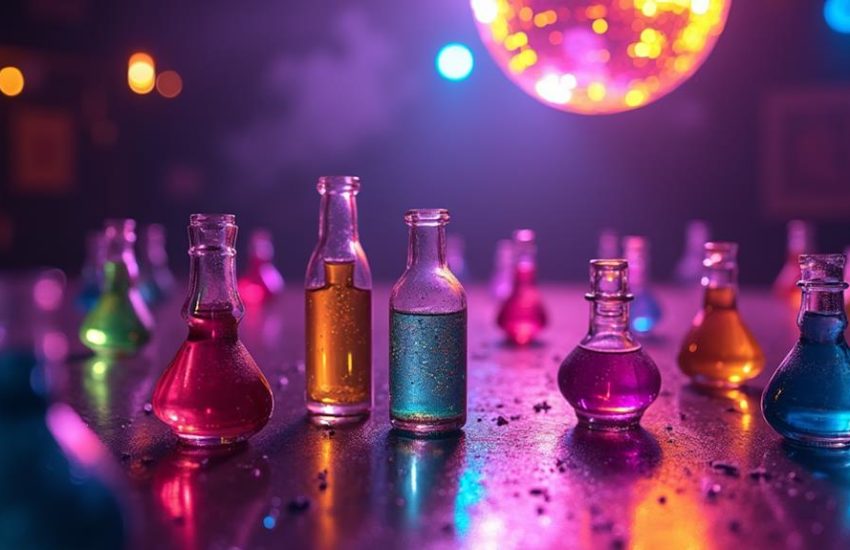Chasing the Dragon: How Poppers Overuse Can Ruin Your Life
Poppers, initially developed for medicinal purposes, have become a recreational drug with severe consequences for chronic users. Overuse can lead to significant physical health issues, including cardiovascular problems, respiratory damage, and reduced oxygen-carrying capacity in the blood. Mental and emotional impacts include psychological dependence, cognitive impairment, and exacerbation of existing mental health conditions. Socially, poppers abuse can strain relationships, promote isolation, and erode trust. The stigma surrounding drug use often compounds these issues, further diminishing quality of life. Recovery from poppers addiction requires a multifaceted approach, encompassing medical intervention, psychological support, and lifestyle changes. Understanding the full scope of poppers' effects is vital for those seeking help.
The Allure of Poppers

Poppers, a colloquial term for alkyl nitrites, have gained popularity in certain social circles due to their perceived recreational benefits. These volatile substances, initially developed for medicinal purposes, have evolved into sought-after party drugs. Their allure stems from the rapid onset of effects, including a brief euphoric rush, improved sensory experiences, and muscle relaxation.
Nevertheless, users likewise report headaches and nausea after excessive use, which can detract from the initial appeal.
Historical usage of poppers dates back to the 19th century, with their recreational use becoming more prevalent in the 1960s. Cultural perceptions have shaped their reputation, particularly within LGBTQ+ communities, where they are often associated with nightlife and sexual encounters.
The appeal of poppers extends beyond their immediate effects, as they promote a sense of belonging and shared experience among users.
Still, this allure can mask the potential risks associated with frequent or excessive use, leading to dependency and health complications.
Physical Health Consequences

The misuse of alkyl nitrites can lead to a range of detrimental physical health consequences. Prolonged and excessive use of poppers can markedly impact various bodily systems, particularly the cardiovascular and respiratory systems.
Users may experience:
- Severe drops in blood pressure
- Increased risk of stroke or heart attack
- Compromised lung function and respiratory distress
Cardiovascular effects include tachycardia, arrhythmias, and potential damage to blood vessels. The vasodilating properties of poppers can cause dangerous fluctuations in blood pressure, putting strain on the heart.
Respiratory risks are equally concerning, with chronic use potentially leading to methemoglobinemia, a condition that reduces oxygen-carrying capacity in the blood. Furthermore, inhalation of poppers can irritate the lungs and airways, exacerbating existing respiratory conditions.
Users have likewise reported muscle twitching and tremors linked to popper use, highlighting further physical risks. These physical health consequences underscore the importance of understanding the risks associated with poppers use and seeking appropriate medical attention when needed.
Mental and Emotional Toll

Although physical health risks are significant, the mental and emotional impact of poppers overuse should not be overlooked. Chronic use can lead to psychological dependence, exacerbating underlying mental health conditions. Users may experience increased anxiety triggers, with heightened sensitivity to stress and difficulty managing daily challenges.
Emotional instability becomes more pronounced, manifesting as mood swings, irritability, and impaired emotional regulation. Prolonged poppers use can impair cognitive function, affecting memory, concentration, and decision-making abilities. This cognitive decline may contribute to decreased work performance and strained personal relationships.
Furthermore, individuals may struggle with feelings of shame, guilt, or low self-esteem related to their substance use, further isolating them from support systems. The cycle of use and withdrawal can lead to depression and a sense of hopelessness, potentially increasing the risk of suicidal ideation in vulnerable individuals.
Additionally, the risk of neurological damage and addiction from inhalation adds another layer to the mental toll on users.
Relationship and Social Impacts

Relationship and Social Impacts
Although physical and mental health consequences are often the primary focus, overuse of poppers can greatly impact an individual's relationships and social life. The stigma surrounding drug use may lead to social isolation and relationship strain, as loved ones struggle to understand and cope with the user's behavior.
The potential for serious respiratory issues can exacerbate this further, as users might withdraw because of health concerns. Communication breakdown often occurs, exacerbating existing issues and creating new ones.
Poppers overuse can result in:
- Trust issues between partners, friends, and family members
- Emotional dependency on the substance, replacing healthy social connections
- Difficulty maintaining professional relationships due to unreliability or erratic behavior
As users prioritize poppers over social interactions, they may find themselves increasingly isolated from support networks.
This isolation can further fuel the cycle of substance abuse, making it challenging to seek help or maintain meaningful connections. The cumulative effect of these relationship and social impacts can greatly diminish an individual's quality of life and overall well-being.
Breaking Free From Addiction

Breaking free from poppers addiction requires a multifaceted approach tailored to individual needs and circumstances. Effective recovery strategies often involve a combination of medical intervention, psychological counseling, and social support.
For instance, incorporating antioxidant-rich supplements can support eye health recovery. Addiction specialists can help develop personalized treatment plans, addressing both physical dependency and underlying psychological factors.
Support strategies may include cognitive-behavioral therapy, group counseling, and family therapy. These approaches aid in identifying triggers, developing coping mechanisms, and rebuilding damaged relationships.
Recovery resources such as support groups, hotlines, and online communities provide valuable peer support and accountability.
Individuals seeking to overcome poppers addiction should additionally focus on lifestyle changes, including stress management techniques, regular exercise, and healthy social activities.
Call Us To Assist You
Although poppers may offer fleeting euphoria, their prolonged use paradoxically leads to diminished pleasure and profound devastation across multiple life domains. The irony lies in seeking liberation through a substance that ultimately binds. As research elucidates the far-reaching consequences of poppers abuse, from physical deterioration to psychological distress and social isolation, the imperative for evidence-based interventions becomes clear. Breaking free from this addiction requires a multifaceted approach, addressing both physiological dependence and underlying psychosocial factors.


